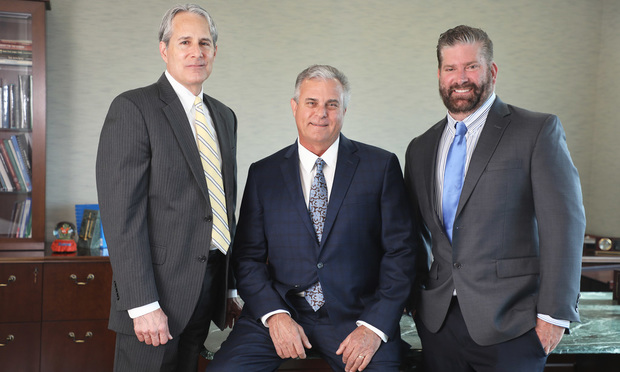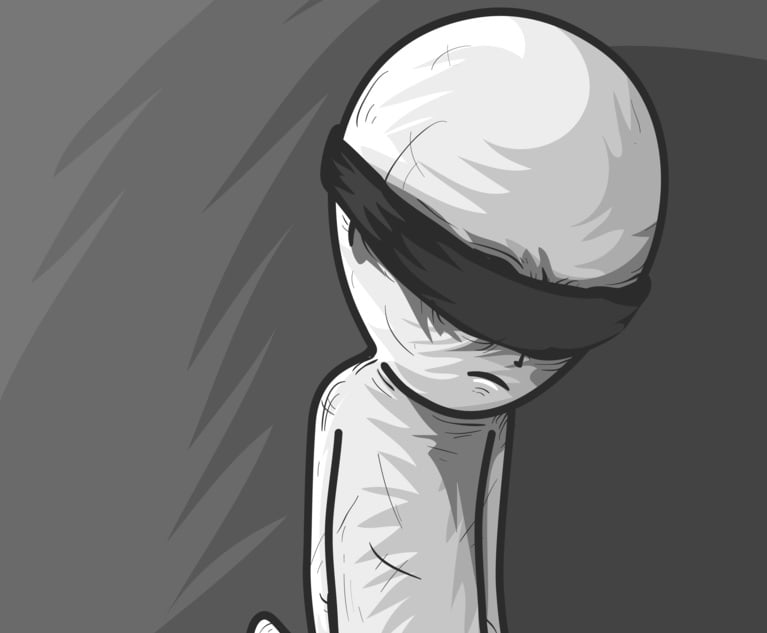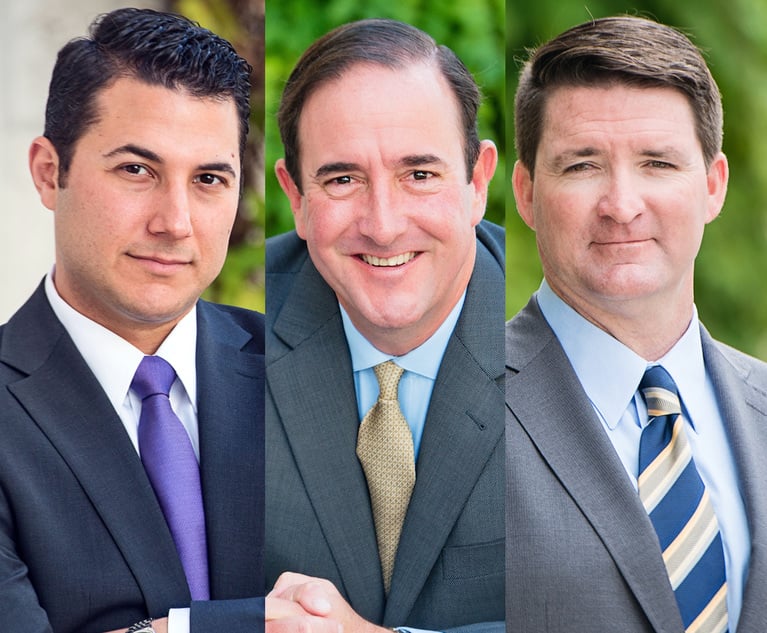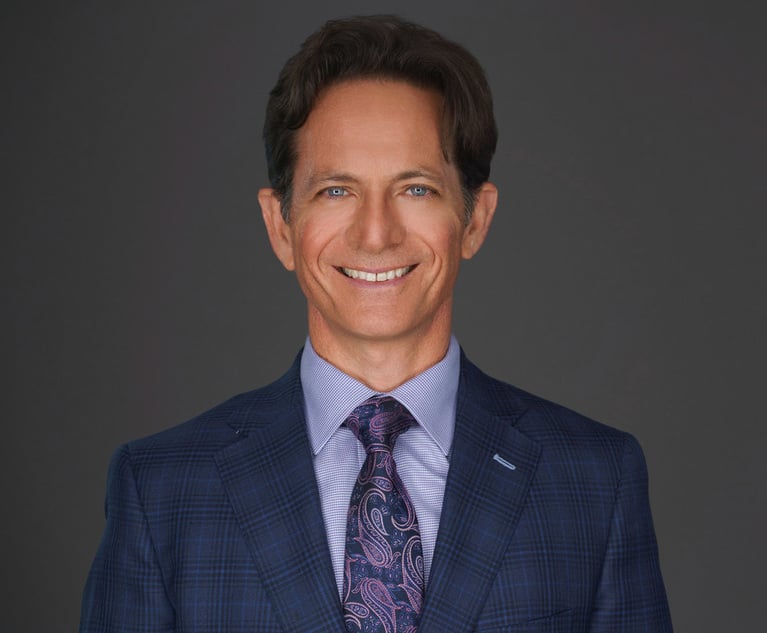South Florida Lawyers Drive $6 Million Settlement for Cyclist Hit by Porsche
Christopher W. Royer, Joseph J. Slama and John D. Mooney represent Andy Introini, who sued after he was hit by a Porsche at a Miami Beach crosswalk.
April 15, 2019 at 02:33 PM
7 minute read
 Fort Lauderdale- from left, Christopher W. Royer and Joseph J. Slama of Krupnick Campbell Malone Buser Slama Hancock and John Mooney, of John D. Mooney P.A. Photo: J. Albert Diaz/ALM.
Fort Lauderdale- from left, Christopher W. Royer and Joseph J. Slama of Krupnick Campbell Malone Buser Slama Hancock and John Mooney, of John D. Mooney P.A. Photo: J. Albert Diaz/ALM.
Fort Lauderdale lawyers Christopher W. Royer, Joseph J. Slama and John D. Mooney negotiated a $6 million settlement for a cyclist claiming to have a mild traumatic brain injury after being hit by a Porsche at a crosswalk.
Construction worker Andy Introini, 31, was peddling around Miami Beach on Nov. 8, 2017. But as he crossed at the intersection of 21st Street and Collins Avenue, driver Raymond H. Maroon Jr. allegedly made a high-speed right turn with his 2018 911 Porsche.
The luxury car struck Introini's bicycle, according to Slama, sending the cyclist flying onto the windshield before slamming onto the tarmac, where he hit the side of his head. Introini sued a year later in Miami-Dade Circuit Court, alleging Maroon didn't look properly before turning. He sought damages for medical expenses and pain and suffering.
The plaintiff couldn't remember the accident, so Slama, Royer and Mooney visited the scene to videotape statements from two independent eye witnesses, who separately confirmed that Introini had the right of way and wasn't riding quickly before the crash.
“I'm a big believer in that,” Slama said of the conversations with witnesses. “That way, the witness can actually see the scene and report it as you're standing right there with them.”
Defense attorneys Andrew M. Westhafer and Leonard L. Gardner did not respond to a request for comment by deadline, but raised comparative negligence in their answer to the complaint. They argued Introini was at fault for colliding with the Porsche and pointed out he wasn't wearing a helmet.
Plaintiff counsel said Florida law doesn't require adult cyclists to wear a helmet, and Slama argued that even if Introini had been wearing one, it wouldn't have covered the side of his head that was struck. The plaintiff's team deposed the driver, Maroon, who admitted he hadn't seen Introini until the cyclist hit the windscreen, though nothing blocked his view and the lighting was normal.
Maroon claimed he was going 2 or 3 miles per hour, but Slama argued that eye witnesses and basic physics suggested otherwise.
“With the marks on the car from the points of rust of the bike and Andy's body, we were prepared with an accident reconstruction engineer to show how, physically, [the defendant] came in at a certain speed,” Slama said.
Slama, Royer and Mooney also obtained transcripts from emergency responders, who found Introini initially lost consciousness and had blood trickling from his left ear — telltale signs of traumatic brain injury. Introini had various imaging scans taken at Jackson Memorial Hospital and was also diagnosed with facial nerve, shoulder and spine injuries.
Click here to read the complaint
Introini had swift shoulder surgery, and his spine injuries proved manageable with physical therapy and other treatment. So for Slama, Royer and Mooney, the case hinged on proving their client suffered from a lasting traumatic brain injury. That wasn't easy to show, particularly because Introini's injuries appeared to be mild.
The plaintiff had follow-up CT and MRI scans, which showed trauma to his right temporal lobe and central nervous system hadn't gone away. Introini also reported having trouble concentrating, memory lapses, dizzy spells, headaches, pain and loss of balance, and his doctor's report linked irreversible injuries with the collision.
But the defense's expert radiologist challenged the plaintiff's imaging scans, claiming they didn't prove a traumatic brain injury. The defense also highlighted Introini had never finished high school and there were no apparent changes to his IQ. He also suffered from attention-deficit/hyperactivity disorder, which affects concentration and cognitive function.
But Diffusion Tensor Imaging — a neuroimaging technique that gives insights into brain network connectivity — picked up signs of injury. It was mild, according to Slama, but it was there. The problem for Introini, like most adults with mild to moderate brain injuries, was that his issues weren't obvious.
“To sit and meet him, he did not look injured,” Slama said. “When you speak to him, he doesn't sound injured. He doesn't slur his speech, there's nothing overt. If you sat and had a simple conversation with him, you really wouldn't notice anything out of the way.”
Royer, Slama and Mooney also retained a neuropsychiatrist who specialized in traumatic brain injuries, having studied patients over decades to measure the affects of their injuries. Introini did various tests over several days, including word recollection, image recreation and psychological personality testing.
Introini showed good long-term recall, but struggled with short-term memory and concentration — problems that aren't easy to show to jurors. He was more worried about Introini's future as mild brain trauma tends to reveal itself over time.
“The trouble is, people even with a mild traumatic brain injury are more susceptible to early onset of dementia and other issues that occur down the line,” Slama said. “Thankfully, he's not permanently and totally disabled here today, but we're very cautious about his future.”
Slama said his team would have sought about $9 million to $11 million at trial, but the $6 million settlement means his client now has the money to try out new therapies and medications as they emerge.
Another benefit to settling was avoiding the risks that come with a jury. Though Introini's history of traffic infractions was nothing major, there was a danger of it working against him, the way Slama saw it.
“Let's face it, when someone's making a claim in court, their background is an open book and there was a concern that [jurors] may penalize him for it,” Slama said.
The case resolved in March — less than a year after it began, which Slama claims is his team's modus operandi.
“We pride ourselves on being sort of a one, two punch. You don't get any rest,” Slama said. “We move quickly and try to resolve cases as quickly as we can.”
Case: Andy R. Introini v. Raymond H. Maroon Jr.
Case No.: 2018-011379-CA-01
Description: Auto negligence
Filing date: April 10, 2018
Settlement date: Feb. 12, 2019
Judge: Miami-Dade Circuit Judge Carlos Guzman
Plaintiffs attorneys: Joseph J. Slama and Christopher R. Royer, Krupnick, Campell, Malone, Buser, Slama, Hancock, Fort Lauderdale; John D. Mooney, John D. Mooney P.A., Fort Lauderdale
Defense attorneys: Andrew M. Westhafer, Law Offices of J. Christopher Norris; Leonard L. Gardner, McGuinness & Cicero, Sunrise
Settlement amount: $6 million
More verdicts and settlements:
Miami-Dade Lawyers Negotiate $2M Presuit Settlement for Child Abused by Landlord
South Florida Attorneys Win $4.8M Over Former Lawyer's 'Preventable' Heart Attack on Birthday Cruise
'All Our Clients Are Gone': How South Florida Lawyers Hit Big Tobacco With Bittersweet $37M Verdict
This content has been archived. It is available through our partners, LexisNexis® and Bloomberg Law.
To view this content, please continue to their sites.
Not a Lexis Subscriber?
Subscribe Now
Not a Bloomberg Law Subscriber?
Subscribe Now
NOT FOR REPRINT
© 2025 ALM Global, LLC, All Rights Reserved. Request academic re-use from www.copyright.com. All other uses, submit a request to [email protected]. For more information visit Asset & Logo Licensing.
You Might Like
View All
Automaker Pleads Guilty and Agrees to $1.6 Billion in Payouts

'I've Seen Terrible Things': Lawyer Predicts Spike in Hazing Suits

Florida Retention Ponds Scrutinized in Lawsuit After Latest Child Drowning
Trending Stories
Who Got The Work
J. Brugh Lower of Gibbons has entered an appearance for industrial equipment supplier Devco Corporation in a pending trademark infringement lawsuit. The suit, accusing the defendant of selling knock-off Graco products, was filed Dec. 18 in New Jersey District Court by Rivkin Radler on behalf of Graco Inc. and Graco Minnesota. The case, assigned to U.S. District Judge Zahid N. Quraishi, is 3:24-cv-11294, Graco Inc. et al v. Devco Corporation.
Who Got The Work
Rebecca Maller-Stein and Kent A. Yalowitz of Arnold & Porter Kaye Scholer have entered their appearances for Hanaco Venture Capital and its executives, Lior Prosor and David Frankel, in a pending securities lawsuit. The action, filed on Dec. 24 in New York Southern District Court by Zell, Aron & Co. on behalf of Goldeneye Advisors, accuses the defendants of negligently and fraudulently managing the plaintiff's $1 million investment. The case, assigned to U.S. District Judge Vernon S. Broderick, is 1:24-cv-09918, Goldeneye Advisors, LLC v. Hanaco Venture Capital, Ltd. et al.
Who Got The Work
Attorneys from A&O Shearman has stepped in as defense counsel for Toronto-Dominion Bank and other defendants in a pending securities class action. The suit, filed Dec. 11 in New York Southern District Court by Bleichmar Fonti & Auld, accuses the defendants of concealing the bank's 'pervasive' deficiencies in regards to its compliance with the Bank Secrecy Act and the quality of its anti-money laundering controls. The case, assigned to U.S. District Judge Arun Subramanian, is 1:24-cv-09445, Gonzalez v. The Toronto-Dominion Bank et al.
Who Got The Work
Crown Castle International, a Pennsylvania company providing shared communications infrastructure, has turned to Luke D. Wolf of Gordon Rees Scully Mansukhani to fend off a pending breach-of-contract lawsuit. The court action, filed Nov. 25 in Michigan Eastern District Court by Hooper Hathaway PC on behalf of The Town Residences LLC, accuses Crown Castle of failing to transfer approximately $30,000 in utility payments from T-Mobile in breach of a roof-top lease and assignment agreement. The case, assigned to U.S. District Judge Susan K. Declercq, is 2:24-cv-13131, The Town Residences LLC v. T-Mobile US, Inc. et al.
Who Got The Work
Wilfred P. Coronato and Daniel M. Schwartz of McCarter & English have stepped in as defense counsel to Electrolux Home Products Inc. in a pending product liability lawsuit. The court action, filed Nov. 26 in New York Eastern District Court by Poulos Lopiccolo PC and Nagel Rice LLP on behalf of David Stern, alleges that the defendant's refrigerators’ drawers and shelving repeatedly break and fall apart within months after purchase. The case, assigned to U.S. District Judge Joan M. Azrack, is 2:24-cv-08204, Stern v. Electrolux Home Products, Inc.
Featured Firms
Law Offices of Gary Martin Hays & Associates, P.C.
(470) 294-1674
Law Offices of Mark E. Salomone
(857) 444-6468
Smith & Hassler
(713) 739-1250







